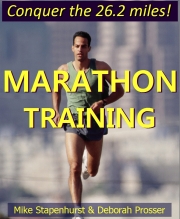| ||||||||||||||||||||
|
|
'26.2' - The Marathon Training Website:
Marathon Success Secrets
I: Pre-Race Training
Donít
Over-train
A good marathon program will have a
total of between 600 and 800 training miles, depending on the
experience and ability of the individual. II: Race Day
Adjust Your
Marathon Time Goal? The problem is that a lot of people start out with a goal in mind and are reluctant to change it. They start out at their planned pace and try to maintain it throughout the race, instead of varying it as needed. An experienced marathoner will always try to keep some energy in reserve for the later stages of the race. I have run my best marathons at a varied pace, sometimes with a second half faster than the first.
Run relaxed You must run at your own pace - and that's going to be the pace at which you are comfortable (not necessarily your original intended pace!). Don't try to keep up with others if you have to push yourself early on in the race. The secret is to be relaxed and settle into a rhythm that keeps you going mile after mile, without straining.
Be Mentally Prepared
Be Goal Oriented Don't dwell on the long distance you have to go! After completing 10K, 20 miles still seems forever. Instead set up intermediate goals, for example:
As you reach each point, pat yourself on the back and focus on the few miles needed to reach the next goal. This helps a lot to get you through the full race distance, - try it in your next marathon.
Walk? This is contrary to many people's concept of running a race, and generally they are right. Except for the marathon. This is a very long distance and anything can happen. Usually people run until through sheer fatigue, they are forced to walk. This is where an experienced runner can do better than a novice - you have to be in tune with your body. If you sense the onset of leg pain, weariness or any other discomfort, then stop and walk for a few minutes, - before you have to! I've done this before, and was surprised that I was able to regain my running rhythm, and ended up passing many other runners during the last three miles of the race.
There are many other factors that affects a runner's ability to master the marathon distance, but if you follow the above tips that should definitely help!
Have a great race!
Advertisement
Marathon Training For Beginners
For every runner who wants
to succeed at the
marathon distance - even
on their first try!
Produced by certified trainer
Jago Holmes,
this ebook is
a 'must have' if
you are just getting started in marathon running.
Based on Jago's own experience as a successful marathoner and
trainer, his program is tailored specifically to the needs of the
beginner marathon runner. Jago is also
including as a free bonus
seven additional ebooks
on topics like Marathon
Nutrition, and
Injury Prevention.
The 100 Day Marathon Training Program
by Marius Bakken, Olympic Runner
**********************************************
| |||||||||||||||||||






 Even if youíve run marathons before, the sheer mental effort needed
to get you through certain parts of the run can take you by
surprise. During your training itís a good idea to go out in less
than ideal conditions just to force yourself to cope mentally. We
generally lead quite sheltered lives and donít like to get too wet
or too cold etc. You need to compensate for this from time to time.
Even if youíve run marathons before, the sheer mental effort needed
to get you through certain parts of the run can take you by
surprise. During your training itís a good idea to go out in less
than ideal conditions just to force yourself to cope mentally. We
generally lead quite sheltered lives and donít like to get too wet
or too cold etc. You need to compensate for this from time to time.
